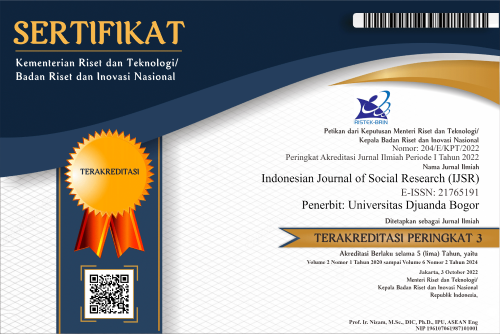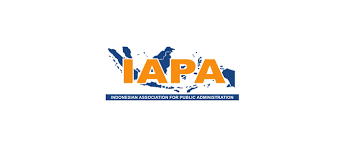Waqf Manager (Nazir) Coaching and Competence in The Development of Productive Waqf
Abstract
The development of productive waqf cannot be separated from the competent role of nazir in managing waqf. One of the efforts to improve Nazir's competence is through coaching. This study aims to determine the effect of coaching on increasing nazir's competence to develop productive waqf in Bogor Regency. The research method uses quantitative research with data collection techniques to distribute questionnaires. Data collection was based on a purposive sampling technique for nazir who had received coaching from the Indonesian Waqf Board and the Ministry of Religion, Bogor Regency. The data analysis technique uses Partial Least Square with the help of the Smart PLS 3 application to verify and confirm the coaching that has been done. The results showed that coaching had a positive and significant effect on increasing nazir's competence in developing productive waqf. The increasing competence of Nazir in the development of productive waqf is not enough just to have knowledge and understanding of the science of fiqh alone but must be equipped with competence in business management and entrepreneurship. So that the carried out must be more on the management and development of business-oriented waqf assets.
References
Ali, K. M., Yuliani, M., Multasih, S., & Abdullah, Z. (2018). Priority Aspects of Waqf Management in Indonesia. Al Falah: Journal of Islamic Economics, 3(1), 1-28.
Budiman, M. A. (2014). The Significance of Waqf for Economic Development. Munich: Munich Personal RePec Archive.
Cizacka, M. (1998). Awqaf in History and Its Implications for Modern Islamic Economies. Journal of Islamic Economic Studies, 6(1), 43-70.
Habibaty, D. M. (2017). Nazir's Competence in Productive Waqf Judging from Law No. 41 of 2004 concerning Waqf. Al-Awqaf: Jurnal Wakaf dan Ekonomi Islam, 10(2), 154-161.
Hair, J., & et.al. (2010). Multivariate Data Analysis. Upper Saddle River, NJ: Prentice Hall.
Haryono, E. (2019, May 7). Bank Indonesia. Retrieved from bi.go.id: https://www.bi.go.id/id/publikasi/ruang-media/news-release/Pages/sp_2312021.aspx
Kahf, M., & Mohomed, A. N. (2017). Cash Waqf: An Innovative Instrument of Personal Finance in Islamic Banking. Journal of Islamic Economics, Banking and Finance, 13(3), 13-29.
Kasdi, A. (2014). Productive Waqf Empowerment Model in Indonesia. ZISWAF: Jurnal Zakat dan Wakaf, 1(1), 108-122. Retrieved from http://dx.doi.org/10.21043/ziswaf.v1i1.1528
Khamis, S. R., & Salleh, M. C. (2018). Study on The Efficiency of Cash Waqf Management In Malaysia. Journal of Islamic Monetary Economics and Finance, 4(1), 61-84.
KNKS. (2019). Study of Mapping the Potential for Development of Waqf Assets and Analysis of the Ministry of Religion's SIWAK Process in DKI Jakarta, Bandung City and Bogor Regency. Jakarta: National Sharia Finance Committee.
M, J. H., & Abdillah, W. (2016). PLS (Partial Least Square) Concepts & Applications for Empirical Research. Yogyakarta: BPFE.
Indonesian media. (2020, December 8). BWI Bogor Regency Holds Nadzir Waqf Coaching. Retrieved March 10, 2021, from https://mediaindonesia.com/humaniora/367251/bwi-kabupaten-bogor-gelar-pembinaan-nadzir-wakaf
Mubarok, J. (2008). Productive Waqf. Bandung: Symbiosis Rekatama Media.
Munawar, W., & Mufraini, M. A. (2021). Productive Waqf, Economic Empowerment, and Public Welfare: Evidence from Benefit Recipients at Daarut Tauhiid Waqf Institution. Inferensi, Jurnal Penelitian Sosial Keagamaan, 15(1), 1-24.
Munawar, W. (2021). Nazir Waqf Professionality: Study of Productive Waqf Management at the Daarut Tauhiid Waqf Institute. Journal of Islamic Economics and Finance Studies, 2(1), 17-33.
Nafi'uddin, M. Z., & Ekawaty, M. (2019). Nazir's Understanding of Productive Waqf and Its Determinants: A Case Study of Nazir in Malang City. AL-AWQAF: Jurnal Wakaf dan Ekonomi Islam, 12(2), 125-142.
Priyaman, L. (2019, September 29). Retrieved from https://bwi.or.id/index.php/en/publikasi/article/1195-manajemen-aset-wakaf.html
Qahaf, M. (2004). Productive Waqf Management. Jakarta: Khalifa.
Syafiq, A. (2017). Utilization of Cash Waqf Funds for Financing Infrastructure Development. ZISWAF: Jurnal Zakat dan Wakaf, 4(1), 25-40.
Zainal, V. R. (2016). Management and Development of Productive Waqf. Al-Awqaf: Journal of Endowments and Islamic Economics, 9(1), 1-16. Retrieved from https://doi.org/10.47411/al-awqaf.v9i1.32
Copyright (c) 2022 Indonesian Journal of Social Research (IJSR)

This work is licensed under a Creative Commons Attribution-ShareAlike 4.0 International License.
The Authors submitting a manuscript do so on the understanding that if accepted for publication, copyright publishing of the article shall be assigned/transferred to Indonesian Journal of Social Research (IJSR) Universitas Djuanda as Publisher of the journal. Upon acceptance of an article, authors will be asked to complete a 'Copyright Transfer Agreement'. An e-mail will be sent to the corresponding author confirming receipt of the manuscript together with a 'Copyright Transfer Agreement' form by online version of this agreement.
Indonesian Journal of Social Research (IJSR) Universitas Djuanda, the Editors and the Editorial Board make every effort to ensure that no wrong or misleading data, opinions or statements be published in the journal. In any way, the contents of the articles and advertisements published in the Indonesian Journal of Social Research (IJSR) Universitas Djuanda are sole and exclusive responsibility of their respective authors and advertisers.
Remember, even though we ask for a transfer of copyright, our journal authors retain (or are granted back) significant scholarly rights as mention before.
The Copyright Transfer Agreement (CTA) Form can be downloaded here: Copyright Transfer Agreement-IJSR 2020
The copyright form should be signed electronically and send to the Editorial Office e-mail below:
Dr. Rasmitadila, M.Pd (Editor-in-Chief)
Universitas Djuanda
Jl. Tol Jagorawi No.1, Ciawi, Kec. Ciawi, Bogor, Jawa Barat 16720
Website: http://journal.unida.ac.id/index.php/IJSR/index
Email: ijsr@unida.ac.id





4.png)



